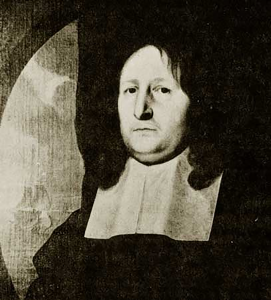Reading someone else’s diary always comes with a thrill. However, it’s a curious fact that as soon as the diary’s owner has died, the illicit becomes commonplace and, if preserved, the diary passes from contraband to dry historical document.
The diary of Samuel Pepys is one of the most well-known of these historical primary sources, but a contemporary of Pepys was Ralph Josselin, who also kept a famous diary.
Ralph Josselin was born in Roxwell in Essex on January 26th, 1617. His grandfather had been a wealthy land owner but his father didn’t do a good job at preserving his inheritance, and Josselin did not inherit his grandfather’s wealth. He did, however, go on to get a good education, and completed his Bachelor of Arts and his Masters at Cambridge University.
He had to take on a variety of jobs to support himself during his studies, and he discovered he had a talent for writing sermons. After he graduated, he became a curate at Olney in Buckinghamshire.
It was at Olney that Ralph Josselin met his wife, Jane. They married in 1640, and the same year they settled in Earls Colne, where Josselin served as vicar until his death in 1683. They had ten children, but three of them died when they were young, and only five survived their father.
Josselin was a very attentive father, and in his diary he wrote about his concerns for his children’s health and happiness, recording Jane’s pregnancies, her miscarriages, and the process of breastfeeding and weaning their children. He seems to have loved his wife very much, referring to her as “delightsome” and lovingly writing of her support, guidance, and affection. Theirs was also a more equal partnership than one might expect for the time they lived in, with Jane making decisions that affected the family and her opinion holding as much sway as Josselin’s.
Where Pepys’ diary is concerned with the minutiae of living in London’s polite society, Ralph Josselin’s diary is more down to earth. He writes about the everyday work of selling and leasing his land, about farming, about the domestic workings of his family and relatives, about the day-to-day life of a country vicar of that era.



